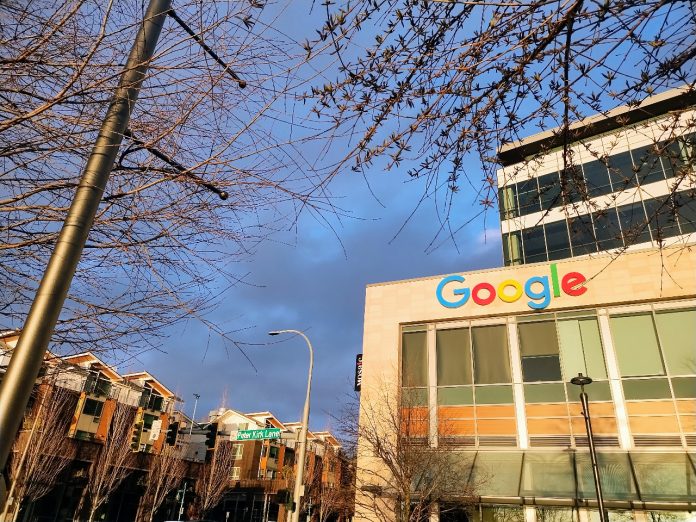
The balance of power in a major Eastside city has the potential to shift after next month’s election, with far-reaching consequences on future housing and transportation decisions. Voters in Kirkland face stark choices in four council races. Each contest is pulling the city into a larger debate about how Kirkland plans for future growth, as a desirable city where people want to live, but which lags behind nearby Redmond and Bellevue in terms of transit access.
For years, Kirkland has been out-in-front when it comes to adopting housing policy reforms. In 2020, the Kirkland council legalized broad types of middle housing throughout the city, the first major Puget Sound city to make that move, years before other cities had their hands forced by a legislative mandate.
But a backlash has been brewing for months, focused around the newly approved Kirkland Comprehensive Plan, which set up a framework for future growth discussions. The plan largely maintained a status quo that focuses housing growth around Downtown Kirkland, Totem Lake, and the area around the coming NE 85th Street bus rapid transit station.
Last year, in the lead up to the plan’s adoption, a proposal to consider future upzones along Kirkland’s other frequent transit corridors garnered significant pushback, including the creation of a new advocacy group that opposed the move: Cherish Kirkland, which describes itself on its website as focused on maintaining the “integrity of [Kirkland’s] residential neighborhoods.” Despite the fact that the Kirkland planning commission stripped the transit corridor proposal from the plan before it even hit the council’s desk, the group still opposed its adoption and language included that promoted the idea of creating “10-minute neighborhoods.”
While Cherish Kirkland decided against becoming a political action committee and endorsing candidates directly, members of the group have been promoting websites touting a “sanity slate” of growth skeptics.
“My unavoidable takeaway from carefully watching City Hall this past year is that the majority of our City officials want to see Kirkland’s neighborhoods take on Seattle’s form – and Seattle’s problems,” read an email sent in September by real estate lawyer and Cherish Kirkland leader Kira Krimkevic, directing readers to a website promoting the slate. “My family and all of our neighbors moved to Kirkland specifically for the neighborhoods. We wanted a safe, quiet place to raise our children. Our City, unfortunately, wants to see our neighborhoods infilled with large buildings and jammed with traffic.”
At an October 13 forum at the Houghton Neighborhood Association, all eight candidates directly sparred over their competing visions for a future Kirkland, after the four anti-growth candidates skipped one held by the Eastside Housing Equity Coalition days earlier. The event made clear the stark choices that Kirkland voters face on November 4.
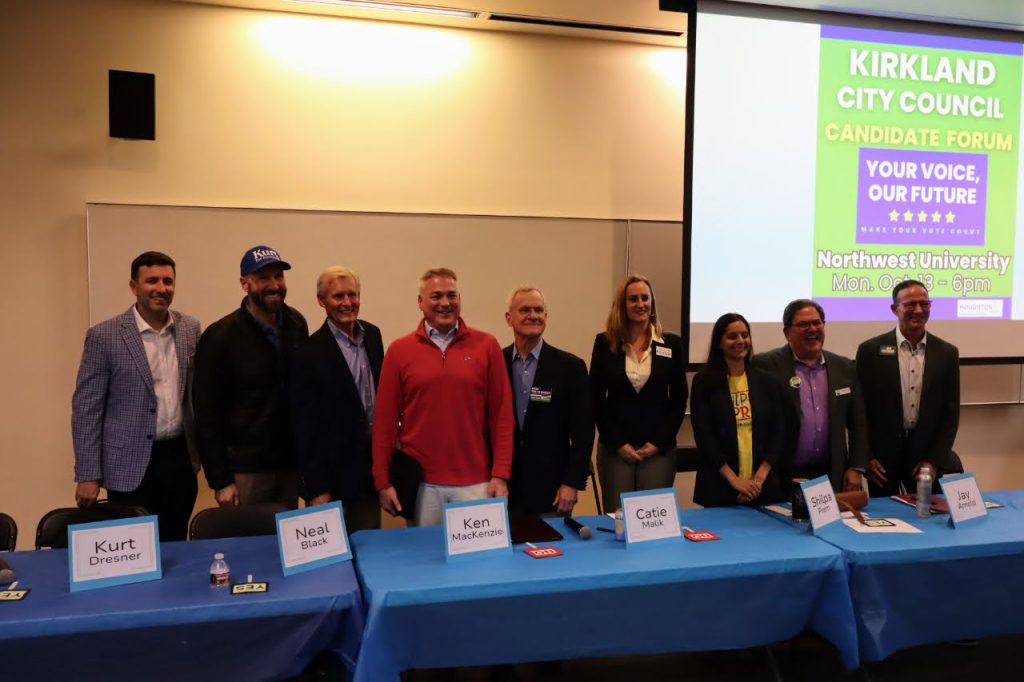
The Urbanist elections committee, which I serve on alongside 13 other members, has also issued endorsements in Kirkland City Council races. You can also review the questionnaires submitted by candidates alongside those endorsements.
“Protecting” neighborhoods vs fostering them
Of the four contests, the race to see who takes the place of retiring Councilmember Penny Sweet may prove to be the most contentious. Sweet has served since 2010 and played a crucial role in the redevelopment of Totem Lake Mall into a high density neighborhood, ending her tenure as an outspoken advocate for increasing housing options throughout Kirkland. Seeking to fill Sweet’s shoes are Shilpa Prem and Catie Malik, who see growth issues very differently.
Prem has earned Sweet’s endorsement, running on a platform of bringing “more and varied housing to our region.”
“Any candidate that tells you that they’ll be able to stop growth in our city is lying to you,” Prem told the crowd in Houghton. “State law requires that we plan for growth by 2044, so the increase in housing that you’re seeing is not just because we just kind of feel like doing it. It’s actually state law and it’s required.”
Malik, who unsuccessfully tried to unseat Kirkland Mayor Kelli Curtis two years ago, touts herself as a “neighborhoods first” candidate and framed the biggest issue facing the next council as a need to protect residential areas from additional density.
“Another thing that kind of rang alarm bells in my head is that transit planning is a good identifier where density is going to go,” Malik said of the Comprehensive Plan. “And we’re going to have the [RapidRide] K Line down 108th and so I want to make sure we’ve got a council there that’s going to protect our residential zoning, and ensure that we preserve residential zoning in our single family neighborhoods.”
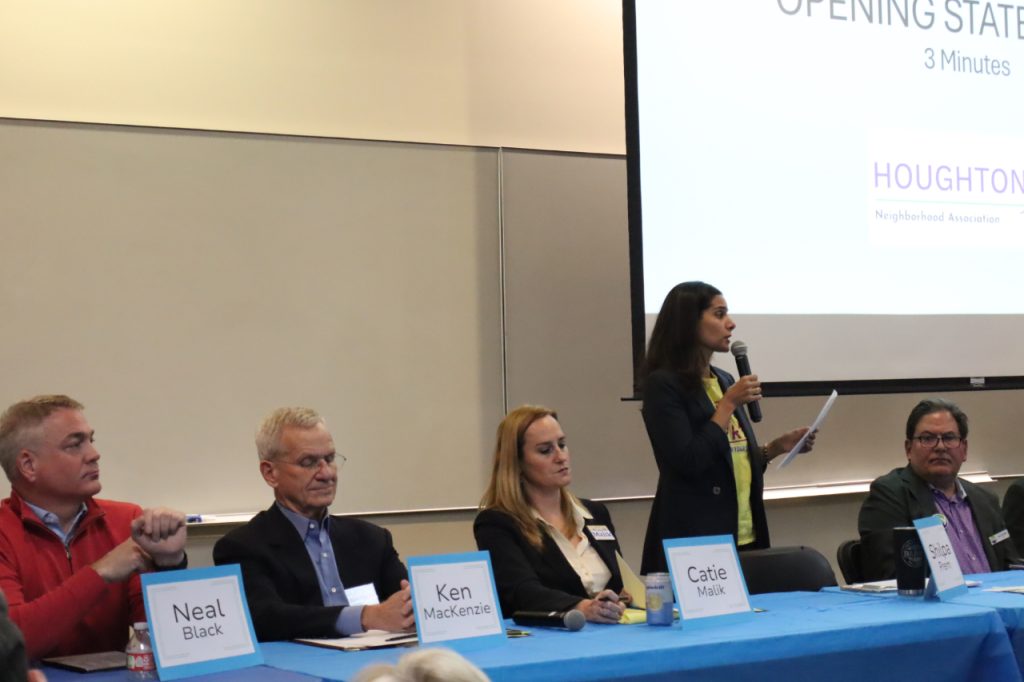
Councilmember Neal Black, who is running for a third term, defended the current council’s record and his vote for the Comprehensive Plan.
“We took a broader vision and we tailored it down and we shaped it after listening to community over the course of two years. So in the end, what did we approve is concentrating growth in our existing neighborhood centers and our urban growth centers, a greater mix of smaller homes in our neighborhoods, instead of seeing nothing but McMansions being built,” Black said. “I’m not looking to erode the quality of life in my own neighborhood, [I want a] greater mix of smaller, affordable homes in our Houghton neighborhood.”
Black’s opponent, Ken MacKenzie, who has taken on “Take Kirkland Back” as a campaign slogan, attacked Black for voting against a superficial amendment to the Comprehensive Plan that promoted neighborhood “livability.” Pointing to the fact that King County Metro plans for transit in Kirkland and not the city, MacKenzie urged caution when it comes to planning around future transit, despite the fact that density and transit often go hand-in-hand.
“We have to plan, I think, on a world of no additional transit, which means we have to be extremely careful about where we put density,” MacKenzie said. “I have reports from people I know in other nearby jurisdictions that said Kirkland kept asking for more and more density, more and more housing, and they couldn’t figure out why Kirkland was doing that. So, I think a good council majority does not ask for more density than they’re assigned.”
Deputy Mayor Jay Arnold, seeking reelection to a fourth term, framed the idea of exploring additional density as a way to ensure that neighborhoods retain their amenities, like existing grocery stores.
“You want that mixed-use community hub that has got housing there, the community retail, all of our favorite places, and preserves the grocery store. Do you know what helps preserve the grocery store? Customers. Do you know what customers are? It’s the housing,” Arnold said. “That’s why we’re saying this happens in our neighborhood centers. And so in the areas where we have housing near those services, we have preserved the grocery stores. In the areas where we have lost housing, we’ve lost them. We’re fortunate to be able to keep PCC in Kirkland, but it moved to a place where there is housing right there. For some people, you want the services to be nearby. For some of you, it’s going to be a short walk. For some people, it might just be downstairs, and that’s how we keep the local neighborhood shopping center.”
Arnold’s opponent, retired corporate executive Ken Oberman, is running on a platform of “preserving residential zoning and stability” and echoed Malik and MacKenzie.
“At the end of the day, I’m all for growth, but it’s got to be done in the right way. You need to look at the areas that can support the growth,” Oberman said. “So, 85th Street, Totem Lake are great areas to drive it and support it. Let’s make sure the infrastructure is in place. I’m okay with vision and looking out, but communities need to maintain the communities, to some extent, you can’t sit there and put a six-story building right next to a bunch of homes.”
Jon Pascal is the only incumbent running for reelection who voted against adopting the Comprehensive Plan. Pascal is facing a tough challenge from Kurt Dresner, one of the leaders of the urbanist advocacy group Liveable Kirkland. Pascal’s slate of endorsements has shrunk significantly in the four years since his last election, with progressive lawmakers in the state legislature like Rep. Davina Duerr and Senator Vandana Slatter and nearby local elected officials including Bothell Mayor Mason Thompson dropping off the list.
“I felt that we should put more emphasis on our commercial areas and urban growth centers. Now, does that mean unlimited height and big, you know, seven-, eight-story buildings? No, that means reasonable growth within our commercial centers that’s matched with infrastructure,” Pascal told the crowd.
Pascal, who works as a transportation consultant during the day, framed November 4 as a turning point for Kirkland.
“There’s a lot at stake with this election. We were one vote away from eliminating residential zoning last year. This election will decide its fate,” Pascal told the crowd. The seemingly ominous move he referenced would have simply renamed the city’s residential areas as “residential-mixed use” but not actually changed any zoning, a step toward fostering more commercial areas away from where businesses are concentrated now.
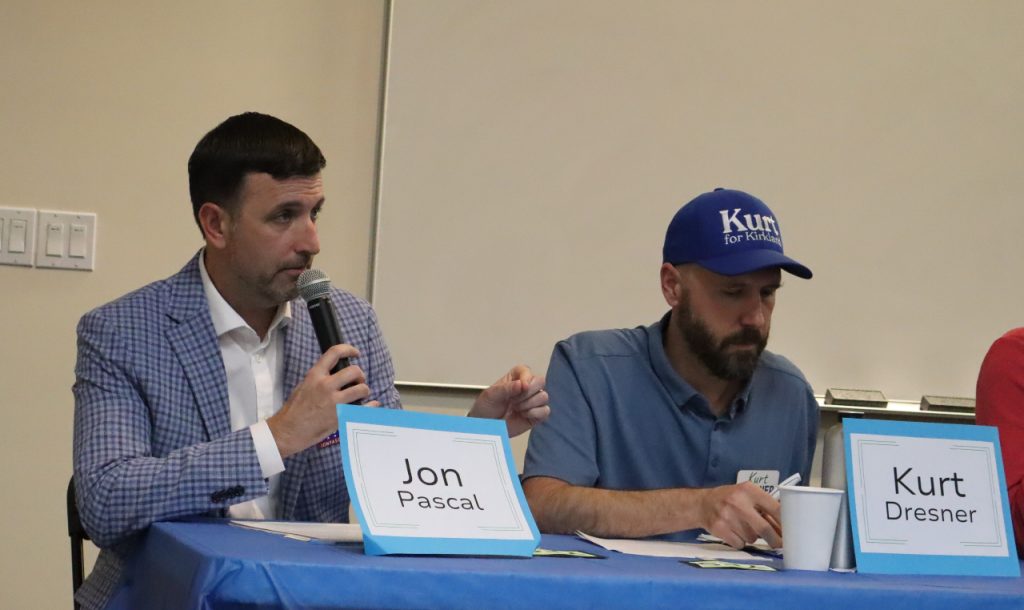
Dresner, who finished nine points behind Pascal in the August primary, framed his campaign as more forward-looking.
“My vision is for a Kirkland that works for every generation,” Dresner said. “It’s a Kirkland where the seniors who built our community can age in place with dignity, surrounded by the neighbors and the parks that they love. And it’s a Kirkland where the kids who grew up here, our kids, including our trans kids, can actually afford to start their own families, continuing the cycle of community. We achieve this by focusing on vibrant, walkable neighborhood centers, protecting our incredible tree canopy and our public parks and building a transportation system that gives us real choices so we can spend more time with our friends and family and less time in traffic. But we won’t get these things without real leadership, and that leadership has to have a real vision for the future that’s more than just denial and obstruction.”
Pushing for a city with less ambition
One thing Malik, MacKenzie, and Oberman definitely agreed on was that Kirkland should be spending less money on outside consultants, with the current process to determine the future of the Houghton Village shopping center Exhibit A in that debate. Purchased by the city in 2022, the current council has been exploring ways to advance both affordable housing and other community amenities on the site, which is close to both the future K Line and the Cross Kirkland Corridor.
Earlier this year, the council reviewed three initial proposals from developers to add affordable housing on the site, all of which would have utilized a development plan to be able to rise to five stories. But with the multifamily development market facing significant uncertainty right now, all three requested additional subsidy from the city to make a project pencil. The idea of additional city subsidy and of buildings that tall has proven controversial in Kirkland.
The “sanity slate” voiced concerns about the city moving forward at all, despite a clear need for cities around the region to invest in subsidized housing. While third-party consultants are an easy target, mid-sized cities often lack the resources to retain specialized staff in house, meaning a push to hire fewer consultants is ultimately a push to do fewer ambitious projects as a city.
“Sell it. No question about it. The city does not belong in the developer business,” MacKenzie said of the Houghton Village property. “There may be people who work for the city that would really like to be property developers, in which case they should quit their job at the City and become property developers. The scheme that was used to allegedly get public input on what should happen to that property was a sham. We were asked for our input. We put a bunch of dots on some stuff, and then it was all just ignored.”
Forum moderator Rick Van Cise tried to get candidates to agree with the “majority of Houghton constituents” that any future building(s) on the site should be no taller than three stories, so as “not to overburden Houghton Everest infrastructure.” Malik, MacKenzie, Oberman, and Pascal all said yes, with Dresner and Black saying no, and Arnold and Prem refusing to answer a binary question.
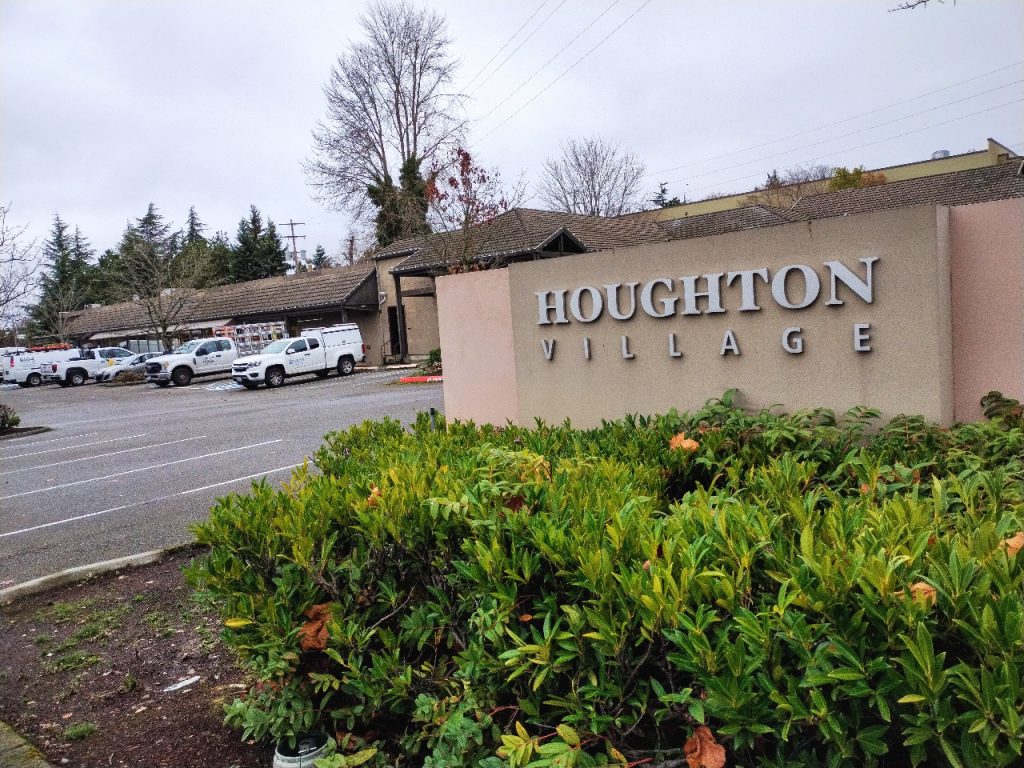
The progressives on the panel argued that projects like Houghton Village are exactly what cities like Kirkland should be doing.
“The reason why the city had purchased it is really to ensure that we had just more control over it. You know, otherwise, a developer can come and develop whatever they want, and most likely they will develop only what’s most profitable, which are townhouses,” Prem said. “And so, I don’t see it being a really great place of just a bunch of townhouses — instead the city has it. We can build things for seniors, youth activities like arts, gathering places and housing, both market [rate] and affordable.”
“What we get through partnering is providing more control and more precision than what we would get just with the developer coming in, where you all would be asking for the same things: where’s our connection with the corridor? Where’s our safe crossings? Where’s the plaza [and] open space,” Arnold said. “So this gives us more control if we’re not able to come to an agreement that meets the needs. Yes, then we’re going to sell it back to the market and and we’ll use the profit that we go from there to meet our goals for housing.”
La Quinta Inn a continued flash point
Another clear dividing line at the Houghton forum was the way candidates approached the issue of the former La Quinta Inn, which King County is months away from opening as a permanent supportive housing facility for people directly exiting homelessness. Located in South Kirkland close to the city’s border with Bellevue, the project has faced significant opposition. In 2022, a nonprofit called “Keep Kids Safe” filed a lawsuit to stop the project, with King County ultimately prevailing in 2024. The City of Kirkland defended King County’s work to advance permanent supportive housing within the city throughout that process.
Out of this year’s council challengers, Catie Malik has taken an especially hard line on the La Quinta facility, writing in a campaign email that permanent supportive housing has “proven itself to be a failure.” Data from King County on its Health Through Housing initiative — which the La Quinta project will be part of — showed that it successfully reduced emergency room visits by 17% and inpatient hospital stays by 22% to 37%, depending on the tenure of stay.
Malik has also pushed for the city to demand specific metrics from the facility’s operator, Plymouth Housing, including how many residents are “moving out to a market rate home,” a request that misunderstands that most people who exit homelessness into permanent supportive housing are not expected to find another place to live. Health Through Housing’s success rate is how long people are able to stay in housing, not how quickly they leave.
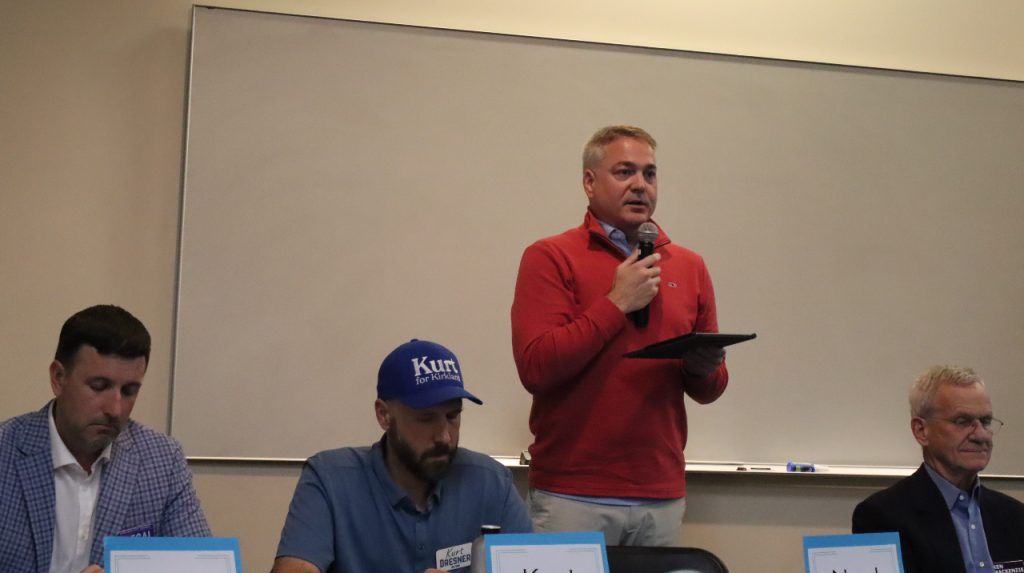
The other Cherish Kirkland-aligned candidates also disparaged the future facility and its residents.
“I completely challenge the theory that the people that in this facility will, by and large, be Kirkland residents,” MacKenzie said. “I don’t believe that for a moment, they’re going to come from all over the place, and they’re going to come from King County, and they’re going to come from Seattle, which doesn’t mean there won’t be any from Kirkland, but this theory that they’re all going to be Kirkland people is just bunk. The people that are in there are going to be warehoused. They’re not going to have useful things to do unless they find it for themselves. And most of them are pretty clever people, and they’ll find things to do, which means, by and large, occupying their time collecting things that they find lying around.”
But again defending the current council’s record, Neal Black reaffirmed the decision to move forward with permanent supportive housing in Kirkland.
“One of the things I want to start out with is the need in our community. So we have a safe parking lot. We have the Sophia Way, a shelter for women and women with families, and when you talk to the leaders who run those organizations, the number one need in our in our community, still to this point, is for permanent supportive housing of this exact kind,” Black said. “People ready to work and pay because they’re paying their income for a lease to pay to get their life back on track. And without this, this becomes the weakest link in the continuum of care. We need to get people from a situation where they’re living rough in tents in our parks, get them into stable lives.”
Ryan Packer has been writing for The Urbanist since 2015, and currently reports full-time as Contributing Editor. Their beats are transportation, land use, public space, traffic safety, and obscure community meetings. Packer has also reported for other regional outlets including BikePortland, Seattle Met, and PubliCola. They live in the Capitol Hill neighborhood of Seattle.

